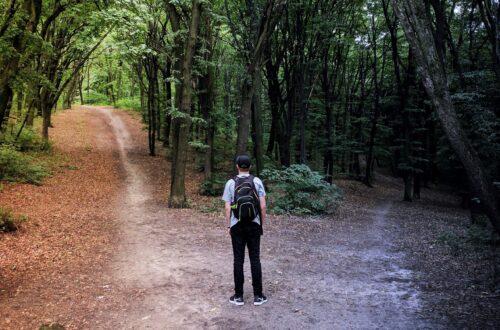
The Garden of Eden: An Evolutionary Tale
Back when I used to teach Mythology to my college students, I would teach a section on creation stories. One of the creation stories I taught was the Garden of Eden. One approach I took was to ask them if they thought the story was a fall or a step up for humanity.
A Fall or a Step-Up for Humanity?
The common interpretation of the Garden of Eden story is that it was a fall for humanity. They lost their place in paradise. However, literally there was no Fall. That notion came from Plato who, in his dialogue, the Phaedrus, talked of spirits in the non-material world, some of whom were filled with a desire for physical pleasure so fell into a body to fulfill it.
There are more esoteric versions of Christianity that do resemble the Plato scenario, but that certainly isn’t traditional Christianity. The more esoteric version of Christianity and Plato are based on the belief that this life here in the physical world is unpleasant at best, and evil at worst, and is a punishment for sin.
Others don’t agree. Sri Aurobindo in his The Life Divine, says God created the world as an expression of love for humanity. Ex-Catholic Priest, Matthew Fox, called creation an “original blessing” not an “original sin.”
Putting all that aside, here, I’m interested in viewing the traditional Christian version of the Garden of Eden story not as a Fall for humanity, but rather as a step up, making it an evolutionary tale.
I will argue that God wanted humans out of the Garden just as parents might want their adult children to eventually move out of their house to start their own lives.
God Is All-Knowing
First off, since God is all-knowing, how is it possible he didn’t know that when he put that tree in the middle of the garden and told Adam and Eve not to eat of it, they would. If God is all-knowing, by definition, he had to know.
Thus, this was no test for humans, but a set-up to get humans out of the garden. Also, if he didn’t want them to eat the fruit from the tree, why put it right in front of them and make it so appealing?
It would be like parents putting a plate of freshly made chocolate chip cookies in front of some young children, telling them that while they’re away, not to eat any. First off, while their parents aren’t God, they could be pretty sure the children would eat a cookie or two while they were gone. And clearly, if they didn’t want the children to eat the cookies why tempt them like that in the first place?
God Planned It All Along
So, God set this situation up, knowing Adam and Eve would succumb to temptation. This was God’s plan all along.
Also, if this was paradise, why does God put that pesky snake in the Garden, making a good argument for eating the fruit. In response to Eve’s statement that if they eat the fruit, surely they would die. The snake replies,
“Ye shall not surely die. For God doth know that in the day ye eat thereof, then your eyes shall be opened, and ye shall be as gods, knowing good and evil.”
Eve’s response leads me to believe that Eve was never tempted to eat the fruit, but used critical thinking and reasoning to decide.
“And when the woman saw that the tree was good for food, and that it was pleasant to the eyes, and a tree to be desired to make one wise, she took of the fruit thereof, and did eat, and gave also unto her husband with her; and he did eat.”
She clearly thought it out before deciding to eat the fruit.
Also, if paradise was so wonderful, why would they be tempted at all? Why wouldn’t they want to stay there? It’s hard to believe that people spend their lives working to attain paradise, and once there become so bored they fall back into earthly life again.
Adam and Eve’s Level of Awareness
Looking at Adam and Eve’s level of consciousness, it appears it was low. This was exhibited by their becoming aware of their nakedness only after they had eaten the fruit.
While they weren’t aware of themselves as separate objects, they did apparently have the ability to reason as we witnessed above. This makes the Garden of Eden story closer to Plato’s version of a Fall.
If they are in a non-material realm, they could reason, despite lacking a physical body. That could explain the dichotomy. This doesn’t change the thesis of this article. Whether we look at the Garden of Eden as an earthly or a heavenly paradise, this was not a Fall for humanity, but a step up.
One can view this as human self-consciousness slowly evolving with the biting of the apple. This gave humanity a much greater awareness and understanding of themselves and their world.
It reminds me of the Epic of Gilgamesh where Enkidu lives in the forest with the animals, and they treat him as one of them. Then when Enkidu ventures into civilization and seemingly has sex with the town courtesan, he can’t go back to nature. All the animals start to shy away from him, treating as an “other”. He no longer belongs with them.
Jean Piaget’s Developmental Stages of Consciousness in Children
This also brings to mind the research Jean Piaget has done tracing the stages in child developmental psychology. His first stage is called the sensory motor stage. Here the infant has no awareness of themself as separate from all the other physical objects around them. Piaget says this stage lasts for the first year and a half to two years of a child’s life.
The second stage in the child’s psychological development is called the pre-operational stage and this begins between 15 and 24 months after the birth of the child. At this stage the child becomes aware of themself as separate from other physical objects in the world. This sounds a lot like what happens to Adam and Eve after they bite the apple and realize they are naked.
Some people would argue that humans had it made in paradise and Adam and Eve’s sin ruined it for everybody. At least that is the Christian interpretation. It is also why Christianity needs Jesus to die for our sins to lift that burden of sin from humanity.
Judaism and Islam don’t believe that original sin is passed on through the generations, thus don’t give Jesus the divine status that Christians do.
Garden of Eden is a Metaphor for Evolving Stages of Consciousness
The Garden of Eden story is a metaphor for growing up, evolving if you will. It is like older children eventually needing to leave home to make their way in the world. If they continued to stay home through their 20s, 30s, 40s and beyond, their individual growth would be stunted.
In the same way, God put that tree in the middle of the garden because he not only knew they would eat of it, he wanted them to. He wanted them to disobey his commands because he needed them to begin to make their own decisions and take responsibility for their lives.
Just as parents are proud of their children when they go out in the world and make something of themselves, so God also wants to be proud of his children when they go out in the world and fulfill their promise.
The Way is Forward, Not Back
That is why Adam and Eve had to leave the garden. Their existence there had become static and stultifying. So, God kicked them out of the garden, and put two angels with flaming swords at the entrance forbidding them to return. Showing that the way is forward into more misery and chaos, not back.
This is something humanity must keep in mind today. We always hear people moaning about the “good ole days” when things were so much better. That may or may not be true, but we are where we are now, and like Adam and Eve, we can’t retreat back; we have to go forward. This is where our growth lies.
Nobody said it would be easy. Why would God create a world with no pain, hardship or problems? What would be the point of it? It sounds almost decadent. Indulging all of our desires and fantasies and never having to suffer any consequences for our bad conduct. It sounds more like hell to me.
No, I believe God created this world for us to grow, and as the sports saying goes, “No pain, no gain.” We all know the good feeling we get when we work hard in some endeavor and it pays off for us. We get to see who we are and what we can do. We get to test ourselves and see what we are made of.
The Buddha: Life is Suffering
Sure, there is lots of pain and suffering, but that’s the point. It’s how we grow. We should welcome it all as a challenge.
The first Noble Truth in Buddhism says “Life is Suffering”. For the Buddhist, this is life. But the Buddha does not leave us hanging there, he also gives us a path out of suffering. We can overcome our suffering and attain enlightenment. Were Adam and Eve enlightened in the garden? I don’t think so. We would never see great masters like Jesus, the Buddha, or Lao-tzu being drawn back into this world of suffering and sorrow. They are beyond that.
The way is not to retreat back to our simpler natures, but to move forward through our human nature. It’s not an easy journey as we all know. That is why the Buddhists believe we have many lifetimes to work our way through it all. Up until the fourth century, there were sects in Christianity that also believed in reincarnation, but that ended when the Christian canon was finally agreed to in the fourth century.
So, for all the above reasons, I believe the Garden of Eden story represents an evolutionary tale for humanity.
To learn more about the magic of the universe: Click this link: The Magical Universe.




